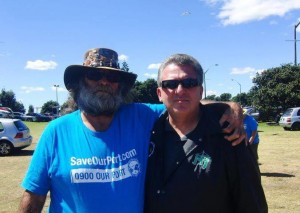
MUNZ workers greeted Ray Familathe, ILWU International Vice President for the Mainland, as ILWU went to New Zealand to show support for the strike.
The New Zealand Herald reports:
American and Australian labour leaders are visiting Auckland this week to boost international support for 300 striking waterside workers, as unionists start picketing ships elsewhere.
Those on strike will meet this afternoon to be addressed by Ray Familathe, the North American vice-president of the International Longshoremen and Warehouse Union.
Mr Familathe was in the thick of a mammoth dispute at Long Beach Harbour in Los Angeles in 1998 in which his longshoremen blockaded a ship carrying Australian meat loaded by non-union labour, forcing it back to Melbourne.
The operator of the Columbus Canada was unable to find any other United States port prepared to accept the shipment, and was allegedly even refused service in Auckland.
Leaders of the Maritime Union of Australia, which was the beneficiary of the longshoremen’s support and which is warning of trouble across the Tasman for ships unloading cargo in Auckland during the current strike, are also due here this week.
That follows mediated talks which ended on Friday with Ports of Auckland complaining that the Maritime Union of New Zealand had “gone backwards rather than presenting some constructive, forward-thinking proposals that will bring this issue to a close”.
Chief executive Tony Gibson said the union was demanding the removal of the company’s right to contract other stevedoring firms to work at the port’s container terminals.
He said that was the practice at the world’s best-performing ports, and was critical to lifting Auckland’s competitiveness.
Union president Garry Parsloe said his team made an 18-point offer to the Auckland Council-owned company, including a proposal to extend eight-hour shifts to 12 hours if needed, to spare the port from having to bring in extra workers to finish servicing ships.
“If they are saying that’s going backwards, that’s not reporting very honestly what happened,” he said.
“They said they wanted some continuity [of operations] and we should work 12 hours. We said we would work 12 hours – I don’t know how more conciliatory we’ve got to be.”
Mr Parsloe said that the union was prepared to resume talks this week, but the visits by the overseas unionists reflected deepening international concern about the dispute.
